One man's quest to complete 21 triathlons in 21 days in 14 states
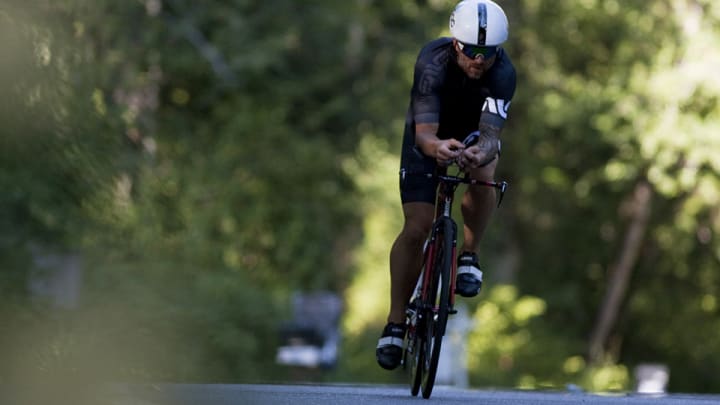
There’s a certain irony to the fact that a documentary entitled TINY: A Story About Living Small would be the catalyst for Jeff Fairbanks’s big idea. But the former semi-pro surfer and current amateur triathlete says Merete Mueller’s film about a couple constructing a “tiny home,” without any previous building experience, inspired him.
“I have no film experience, nor had any desire to ever do film work,” says Fairbanks. “But watching a documentary about a guy who built his tiny home and interlaced his project with people from all over that had evolved into the movement, just struck a chord with me. That was the gap I wanted to fill in triathlon racing.”
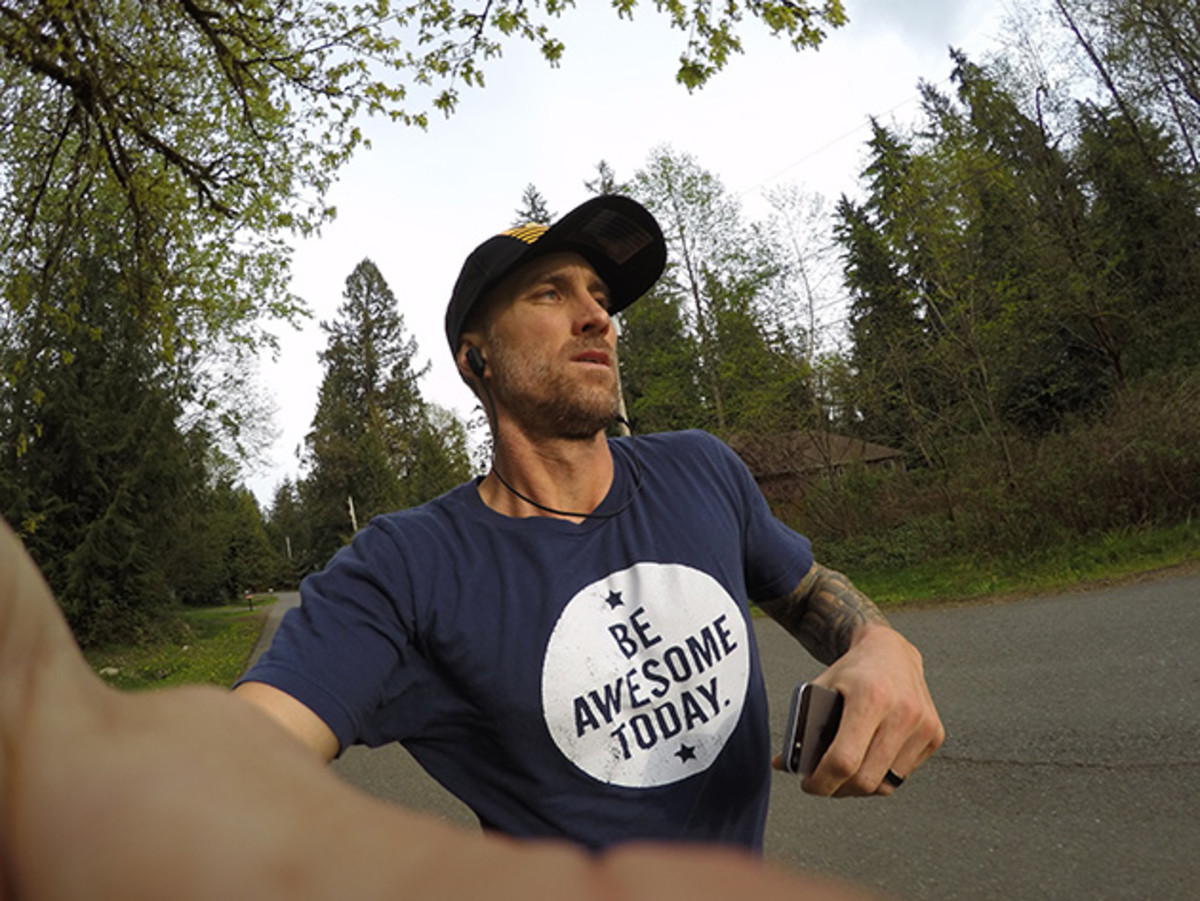
This summer, Fairbanks will embark on an audacious three-week string of 21 triathlons—all at the half-Ironman distance of 70.3 miles—in 14 states along the East Coast to raise awareness about the rank and file of this three-pronged racing discipline. The footage he gathers will provide the raw material for The TRIumph Project, a documentary celebrating his sport of choice.
“This stems from my surfing roots, but when I came into triathlons, I felt it would be a top-down approach,” says Fairbanks. “You know—show the best, convey the best, and hope the masses want to emulate.”
Instead, Fairbanks says he has found the soul of triathlon racing in the majority of the weekend warriors who participate simply to challenge themselves, and not in the elite professional ranks. That, he says, is what he hopes to convey in The TRIumph Project.
The Albuquerque high: Symmonds, Brooks Beasts train at altitude
“It should be about the journey, not just the end destination,” he says. “For me, I wanted to showcase paths of athletes that didn’t come from the traditional means. More importantly, I wanted to showcase the community voice of people from all levels and walks of life. Whether they’re heartfelt stories, or personal achievement stories, age group or pro, I want that variety.”
Even Fairbanks sounds a bit surprised that triathlons not only corralled his attention, but refused to let go. It is, by any measure, an intriguing marriage. The 37-year-old grew up in California, playing traditional stick-and-ball sports like soccer and baseball, as well as indulging in a dalliance with motocross—“Those dreams were cut short at a young age when a friend of my dad had a son who was involved in a fatal accident on his dirt bike,” he says. “After that, my dad pulled away from riding opportunities.” At 15, Fairbanks was introduced to surfing, and fell head over heels.
After his surfing career hit a ceiling, Fairbanks tried his hand at mixed martial arts.

“I had a brief stint of wrestling when I was in junior high school,” he says. “I didn’t really like wrestling at all, mainly because I didn't like wearing those singlets. But I loved the chess match. In MMA, I had to rely on so many different things. I needed to be a Jack-of-all-trades, and not necessarily an expert in only one area. I like that.”
After eventually getting his degree from Cal State San Marcos, Fairbanks moved north to Washington. He entered his first sprint triathlon in July of 2013 in Skagit County, after running a marathon the previous summer. He had no preconceived notions about becoming a regular.
“I was honestly coming at this thing as a one-and-done deal,” says Fairbanks. “I had done the marathon, and it sucked. It was the worst thing ever. But I survived. It took 4½ hours. I blew up a couple of times, but I just suffered through it.
Innovation in Hydration: Sweat testing is next level of sports hydration
“That’s what gave me this confidence. It was terrible, but I thought there has to be something more fun, maybe a similar challenge. That’s what got me to at least try the sprint. I wanted to do an amped-up bucket list. But it was what happened after the race that got me wanting to come back.”
By his own admission, something odd occurred during that inaugural triathlon. Fairbanks, with a flourish of tattoos, showed up resembling a sort of counter-culture competitor. No expensive bicycle, no fancy running shoes, no high-tech gear, no team-sponsored kit.
“I didn't look the part of a typical triathlete,” he says. “There’s a ‘fit-in’ component that I worried about, that overshadowed where I finished. I’ve got a bunch of tattoos, and I didn’t have the right equipment. When everyone showed up, it seemed like everyone knew the drill. I didn’t. I felt kind of laughed at. I felt like I was colorful in a vanilla sea of people who had been doing this their whole lives.”
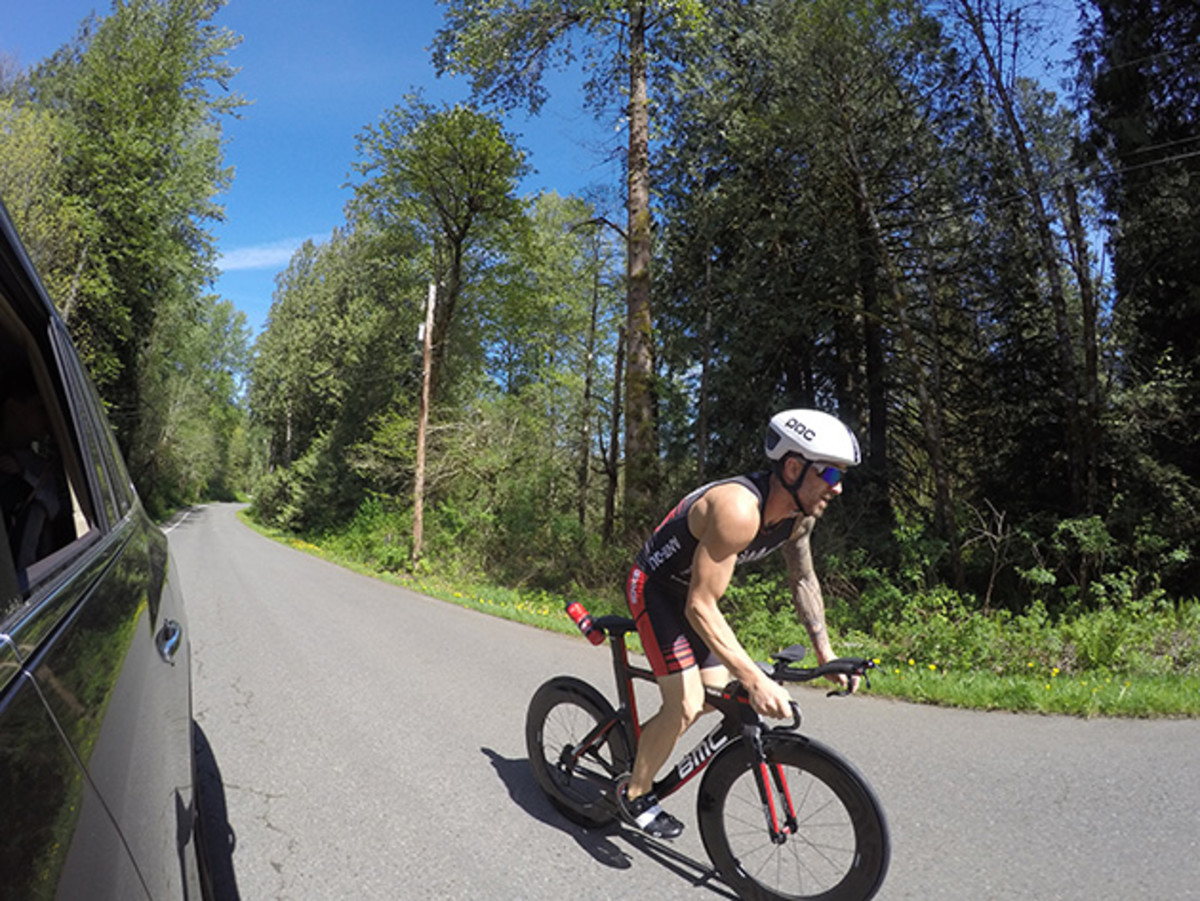
Then Fairbanks raced. He doesn’t remember where he placed. What he does recall, vividly, is the reception he got at the finish line.
“All these people were saying, ‘Hey, I remember you. I saw your tattoos. You were rockin’ it. You’ve got to come back,’” he says. “I never had experienced that. More people were cheering for the people who came in last place than the person who won. That stuff just never happened to me, man.
“In surfing, if you don’t win, people don’t even know you’re in the contest. That [applause], for me, was a trip. At first, I didn’t get it. But the more I’m involved in it, dude, it’s so positive. That’s really changed the way I look at life.”
Adidas’ first skate film features Busenitz, Baxter-Neal, global look
What Fairbanks discovered was that triathlon, while an individual event like surfing and MMA, provides a social network unlike any other sport he had done before. Though he still considers himself something of a “lone wolf,” and doesn’t belong to a particular racing team or club, Fairbanks is nonetheless fascinated by the triathlon “family.”
“What captured me was the camaraderie and support of the community itself. That blew me away,” he says. “To see how, even though everyone was at a ‘race,’ people were doing their own ‘race within a race’ and were so welcoming. That hooked me.
“As it’s evolved, this whole thing has become an eye-opener to what we as people think we can do. For me, this was a whole ‘doubt your self-doubt’ thing. I’m still amazed at what I can do, versus what I think I can do.”
Now relocated to Florida, Fairbanks is married, with two young children, Cohen and Elliette. His wife, Talia, doesn’t run “unless something is chasing her,” he says with a laugh. Fairbanks works in health-care compliance, and still falls back into a rapid-fire, jargon-laced SoCal delivery when he warms up to a topic. Often, that’s when he’s talking about training for or competing in triathlons. Or, more specifically, the people he’s racing with.
“That suffering bond, it’s instant,” says Fairbanks. “You've been to the hurt locker? Oh yeah. It’s just trippy, all the people I’ve met on Instagram. I’ve never talked to these people in my life, and all of a sudden, they’re sending me messages, and I’m training with them. They’re some of the best, supportive people, far more than I’ve met in all my years of surfing.”
The SI Extra Newsletter Get the best of Sports Illustrated delivered right to your inbox
Subscribe
Fairbanks’s upcoming three-week race schedule along the East Coast, slated to start on July 27 (see below), is something of an ode to the sport. It also has an unmistakable “If you swim, pedal, and run it, they will come” vibe. Starting in the outlet haven of Freeport, Maine (home of L.L. Bean, just north of Portland), Fairbanks plans to complete 21 daily half-Ironman efforts (70.3 miles) in 21 different cities, finishing in Vero Beach, Fla., on Aug. 16.
Each “race” will be a solo effort, though Fairbanks says he welcomes participants and spectators.
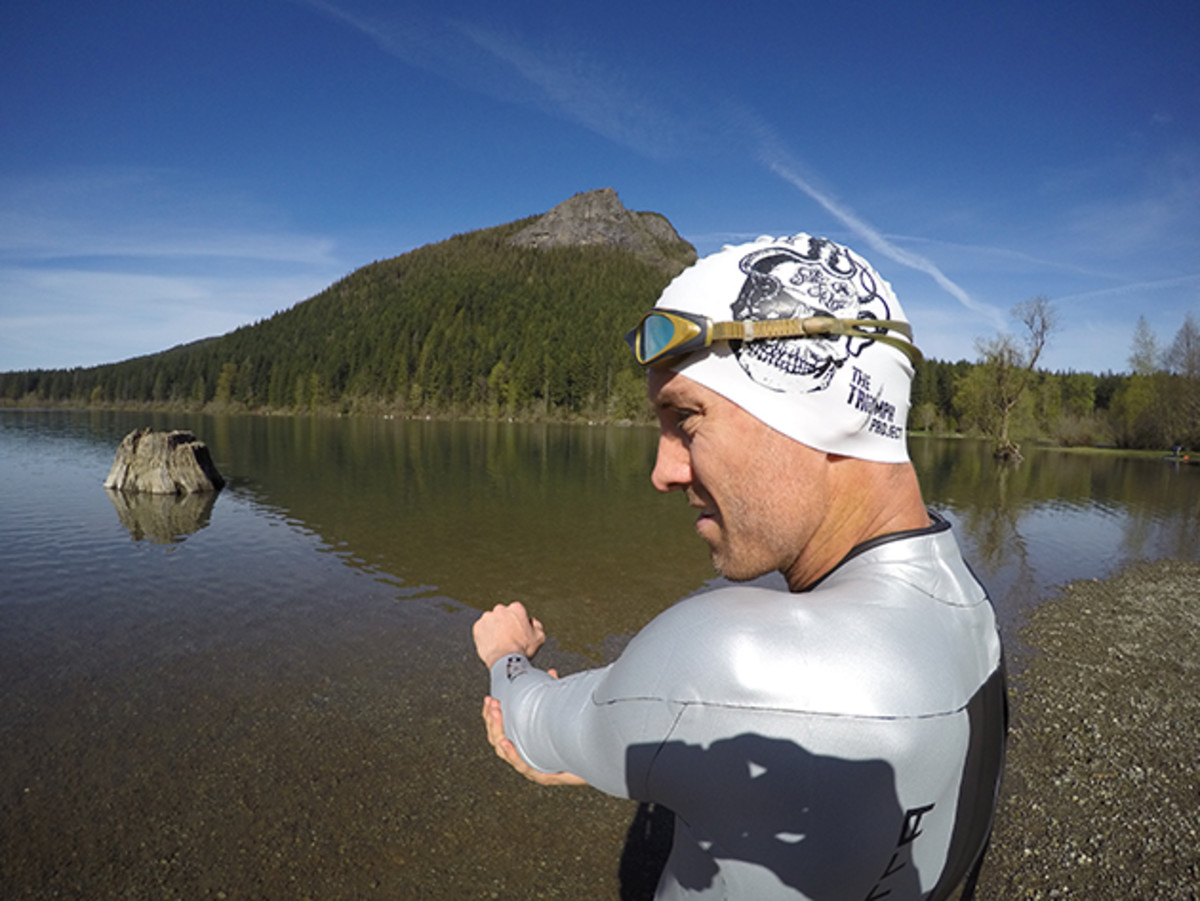
“It’s not a record, or any type of feat like that,” he says. “Hopefully, it’s a catalyst to bring some of the community out to me, to join me on some of these efforts, to convey why [they race] so we can capture the community bond, and their selected life stories.”
Those stories, he says, will serve as the backdrop of The TRIumph Project, which Fairbanks hopes reveals the big picture of the triathlon discipline.
“I want the documentary to get out to as many people as possible, on as many platforms as possible,” says Fairbanks. “It’s not a money-making project. I just want it accessible. The same way I reacted to that TINY documentary, I just want people to relate to us, and see that they can challenge themselves. That's really it.

“If it leads them to give triathlon a try, that’s badass. If it just leads them to push into an area of their life that they never thought possible, then that’s a win for me. If one person writes to me after all this sacrifice, and tells me that they watched this and it inspired them, I’ve won.
“I’ve always wanted to do things that were inspiring. If I can do that, cool.”
TRIumph Project Race Schedule
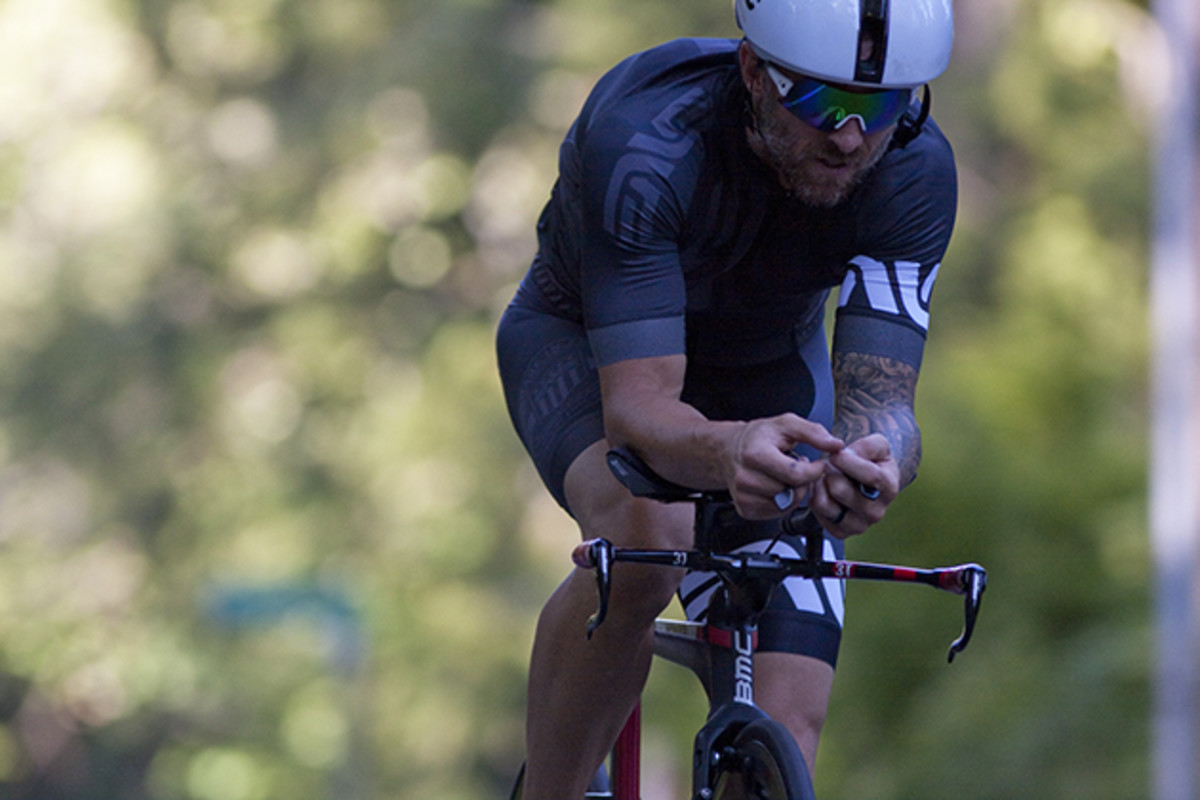
The following is Jeff Fairbanks’s race schedule for the forthcoming documentary, The TRIumph Project. For more details on time and exact location, or to participate, visit thetriumphproject.org
July 27 – Freeport, Maine
July 28 – Old Orchard Beach, Maine
July 29 – Gilford, N.H.
July 30 – East Freetown, Mass.
July 31 – Narragansett, R.I.
Aug. 1 – Westerly, R.I.
Aug. 2 – Middlebury, Conn.
Aug. 3 – Long Island, N.Y.
Aug. 4 – Atlantic City, N.J.
Aug. 5 – Lewes, Del.
Aug. 6 – Cambridge, Md.
Aug. 7 – Cape Charles, Va.
Aug. 8 – Williamsburg, Va.
Aug. 9 – Grimesland, N.C.
Aug. 10 – Wilmington, N.C.
Aug. 11 – Myrtle Beach, S.C.
Aug. 12 – Kiawah Island, S.C.
Aug. 13 – Tybee Island, Ga.
Aug. 14 – St. Augustine, Fla.
Aug. 15 – Clermont, Fla.
Aug. 16 – Vero Beach, Fla.
